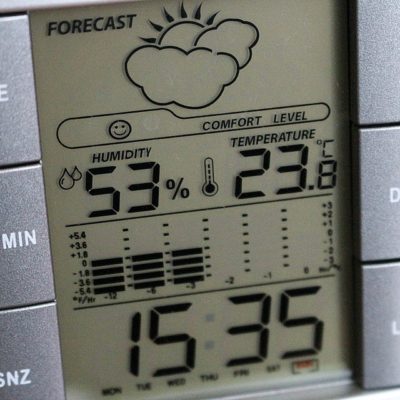How humid is your home? Even if you closely monitor the temperature on the thermostat, you may overlook the relative humidity level.
Defined as the percentage of moisture vapor in the air relative to what it can hold at the current temperature, relative humidity can fluctuate throughout the year.
If your home suffers from consistently high humidity, though, it could result in the five following problems.
#1) Encourages Mold and Mildew
High indoor humidity encourages the growth of mold and mildew.
As explained by the Environmental Protection Agency (EPA), mold- and mildew-causing fungi thrive in moist environments with a relative humidity level of 60% or higher.
You may notice small black specks on windowsills and floorboards, and if not addressed, the fungi will spread to other parts of your home.
#2) Feels Uncomfortably Hot
Your home may feel uncomfortably hot during the summer months if the humidity is high.
The presence of moisture vapor in the air doesn’t directly affect the surrounding temperature. Rather, high indoor humidity can make your home feel warmer because of its ability to interfere with your body’s natural cooling mechanism.
When the humidity inside your home is high, sweat will evaporate off your skin more slowly.
#3) Attracts Pests
Another problem associated with high indoor humidity is pests.
Termites, for example, are attracted to humid environments. They’ll often seek out homes with high humidity, resulting in costly damage to wooden structures.
Other pests attracted to humid environments include centipedes, roaches, scorpions, earwigs, ants and silverfish.
#4) Damage to Walls and Floors
A lesser-known problem caused by high indoor humidity is wall and floor damage.
If you have wood floors in your home, high humidity can cause them to warp. The wood planks will absorb moisture from the air, eventually causing them to swell and warp.
For walls, high humidity can cause paint and wallpaper to bubble or even peel off.
#5) Increases Risk of Infectious Illness
Finally, high indoor humidity can increase you and your family’s risk of infectious illness.
Infection-causing bacteria and viruses thrive in humid environments. As a result, high humidity could be the source of your constant cold and flu infections.
You can avoid humidity problems such as these by properly maintaining your home’s AC unit. Contrary to what some homeowners believe, AC units do more than just cool the air; they lower the humidity.
As long as your AC unit is the right size – as well as properly maintained – it should keep your home’s humidity in check.
If you are experiencing high humidity in your home call us at 512-336-1431 to schedule an appointment. We’ll be glad to come out and take a look at the issue.
1431-183 A/C & Heating proudly serves Round Rock, Georgetown, Cedar Park, Pflugerville, Leander, Liberty Hill and North Austin.

